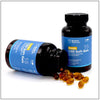Three Ways to Combat Stress

Have you ever been driving along in traffic, minding your business, and enjoying a peaceful trip… only to have a 10 ton semi truck veer into your lane, forcing you to make a split second adjustment to avoid becoming roadkill?
Moments like those are the epitome of stress. At least, acute stress.
Your brain senses a threat, triggering a flood of adrenaline into your system. This causes your blood pressure and heart rate to go up, pupils to dilate, and your body starts rapidly burning through its available fuel to prepare you for fight or flight.
This sudden energy burst is why you’ll often feel so drained as you start to calm down following a stressful situation.
Many of your body’s systems get switched into overdrive in order to respond to immediate threats. Once the threats are gone, your brain needs time to return to normal, and your body needs time to restore some of its depleted resources. Check out the infographic below to see how your body responds to a stressful situation.

But what happens when your brain isn’t able to shift out of threat mode? Basically, you’re forced to keep tapping into reserves just to keep functioning.
This is the reality for many of us dealing with a ton of stress on a daily basis. So in this article, we’re diving into a few tried-and-true methods to help you take the edge off when you need it most.
3 Tools to Help You Stress Less
Exercise
Most of us know that regular exercise can have a number of positive effects on our physical health. But did you know that physical activity can also help improve your ability to respond to stress?
When you work out, your heart rate and blood pressure increase, your breath speeds up, and hormones like cortisol are released into the bloodstream.
These effects are similar to what happens in the body when you encounter unexpected environmental stressors, but come without the real world implications of being cut off in traffic, or discovering your neighbor's pet tiger is on the prowl in your backyard. (Shoutout Texas!)
By exercising regularly, you give your body and mind opportunities to experience temporary discomfort that helps it train for more resilient and adaptive responses when faced with life’s inevitable curveballs.
Essentially, what doesn’t kill you might actually make you stronger. (But not strong enough to take on a tiger. Stay away from the tiger.)
Breathwork
“When the breath is unsteady, all is unsteady; when the breath is still; all is still.”–Yogi Gorakhnath
We know, we know… it’s a little pretentious to try and distill the secrets of life into a single quote from a yogi who lived 1,000 years ago.
But in this case, there’s a growing amount of evidence suggesting that the way we breathe plays a direct role in our quality of life.
For instance, studies show that implementation of a slow, diaphragmatic breathing practice can have positive effects on several health markers, such as increased heart rate variability, improved sleep quality, and a reduction in stress levels.
What makes breathwork even better is the fact there’s almost no barrier to entry. It’s totally free, requires no special equipment, and can be performed in most settings – though we suggest finding a space that is relatively quiet that you can sit or lie down for a few minutes.
There are numerous types of breathwork, and some are more appropriate for achieving specific goals like increasing focus, but we find that box breathing is one of the easiest techniques to perform if you’re new to breathwork.
Here’s how it’s done:
- Inhale through your nose for 4 seconds
- Hold the top of your inhale for 4 seconds
- Exhale through your nose for 4 seconds
- Hold the bottom of your exhale for 4 seconds
- Repeat for up to 4 minutes
Sleep
The inclusion of sleep on this list is pretty much a no-brainer, considering how important getting adequate rest is to overall health.
Sleep is not only when your body undergoes the majority of its restorative processes, but it’s also when a great deal of memory consolidation, cellular waste removal, and neurogenesis (creation of new brain neurons) take place.
Therefore, when you experience poor sleep, it’s pretty noticeable…
You feel sluggish. Your brain is foggy. And your ability to brush off and remain unaffected by little annoyances is much lower.
This happens because your body and brain were not able to adequately recover, and now have to work harder just to make it through the normal tasks of daily life.
Unfortunately, if you’re someone who consistently has trouble sleeping, it’s not as simple as declaring, “Okay, I think I’ll start sleeping better now!”
It takes time to identify poor sleeping habits and routines, eliminate them, and then replace them with new habits that are more conducive to getting quality rest each night.
If you’re unsure how to begin that process, here are a few things that might help move the needle.
- Set a consistent wake and bedtime: By committing to a certain time you will rise each morning and lay down at night, you’re training an internal mechanism known as the circadian clock to associate feelings of tiredness and alertness with more appropriate times of the day.
- Avoid caffeine in the evening: Caffeine is well-known for its stimulating effects that can promote feelings of alertness and focus. This means it can be a great morning boost, but consuming it later in the day can be very disruptive to your body’s wind down routine.
- Minimize light at night: Exposure to light in the evening, especially the type of blue light often emitted from phones, computers, and televisions, can actually disrupt natural melatonin production in the brain, making it harder to fall asleep and stay asleep.
Pro Tip:
The tools mentioned above can go a long way towards helping you stress less, but some of us need a little extra support. If you find yourself in that camp, CBD may be an option for you.
Check out our Stress Collection, which features a variety of products designed to help support a balanced mood, focus, and a healthy response to occasional fatigue and mild stress.†
Curious about what CBD can do for you? Check out our free guide, The Benefits of CBD, to learn more!









